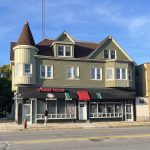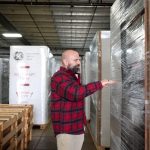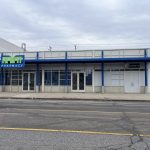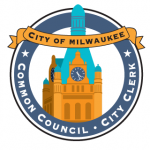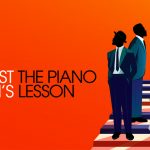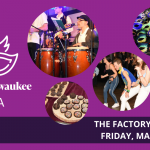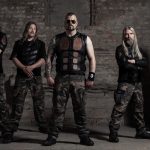From the flood waters
By Jon M. Gilbertson

Allen Toussaint is one of those legends whom not a lot of people know – by name, that is. They might, however, be familiar with songs he wrote: “Working In a Coalmine,” “Lipstick Traces (On a Cigarette).” They have probably heard songs he produced: the original version of “Lady Marmalade,” Lee Dorsey’s “Ya Ya.” They even might have noted his piano playing: as a session man for Joe Cocker and Albert King, among others.
He doesn’t seem to mind being a relatively anonymous individual.
“It merely is my life’s vocation to be a producer,” he says in the mildest of tones. “I’ve been happy to do what I’ve been doing, by being so satisfied and so much in the comfort zone that I never thought much more about that. I don’t really regret or feel anything that should’ve happened didn’t happen thus far.”
Nevertheless, Toussaint has recently experienced greater visibility, in substantial part because in the summer of 2005, Hurricane Katrina flooded his home in New Orleans (the city of his birth in 1938) and washed him out of a lifetime of memories. He moved to New York City and began playing there – in fact, he still does a club residency there.
In New York he encountered an acquaintance, Elvis Costello. Toussaint had worked with him just a little bit before, and on Costello’s 1989 album Spike had played lovely, dexterous piano during the ballad “Deep Dark Truthful Mirror.” Costello had an idea.
“He told me he always wanted to do an Allen Toussaint songbook,” Toussaint says. “And with the timing as it was, we decided to see about bringing that to fruition. It was his brainchild.”
Ah, but children do often surprise us in delightful ways, and so it was with The River in Reverse, the album that Costello and Toussaint released last spring. As fans of either would expect, each brought incredible musicians to the collaboration: Costello the Imposters, Toussaint the Crescent City Horns and guitarist Anthony Brown. And Costello delved well into the Toussaint songbook, narrowing his broad enthusiasm down to seven classics.
Then Costello and Toussaint wrote five songs together, and as a further surprise, the new and the old material coalesced beautifully, as did the musicians. Costello, famously a first-rate singer with a third-rate voice, didn’t so much rise to the occasion as bound up to and vault over it. For Toussaint, The River in Reverse modified an old adage: when one door is submerged, another crests the surface.
He says this pleasurably, as though the pulse is the beat of youth, which it might very well be. After all, Toussaint’s first chance to shine professionally came when he was 17 and called upon by Earl King to substitute for Huey “Piano” Smith at a live show. And last summer, he and the River in Reverse assembly – Costello, Crescent City Horns, Imposters et al –toured substantially enough for him to get his groove on.
Onstage, Toussaint was a lion (and his hair had the qualities of a mane), nodding and smiling at Costello’s complimentary introductions, seating himself at a gorgeous baby grand piano and applying himself to the gospel soul of “On Your Way Down” or the soulfully romantic “All These Things” with the gentle force of a man who knows he doesn’t have to shout to get attention.
“The instant gratification is very rewarding,” he says. “With Elvis you couldn’t ask for better. I’m surrounded by all the things I love, like the horn players. And it’s a grand event each time.”
Even though Toussaint wasn’t onstage the entire time, his presence remained in the form of the horn arrangements he wrote for the songs, including several of Costello’s best-known numbers. It certainly wasn’t lost on Costello or Toussaint that without Katrina the album and the tour wouldn’t really have happened, and in its way The River in Reverse experience turned out to be one of the better commentaries on the natural and manmade disasters of the moment.
“Elvis had such fine oversight – hindsight, earsight,” Toussaint says with a laugh. “Because he had chosen songs of mine and breathed new life into them and found them applicable to this situation. It was obvious that we wanted it to apply to not just this one situation but the whole evolution of mankind. And also, always, to have hope. We were musicians still making music and wanting to feel good.”
The want was fed, although of course it’s a want that wants more and Toussaint plans to tour with Costello again this July, further indicating that more recordings from The River in Reverse sessions will get released. For now, he’s touring on his own with a band that includes drummer Herman LeBeaux, bassist Chris Severin, guitarist Renard Poche and Crescent City Horns player Brian “Breeze” Cayolle. And he does visit New Orleans.
“I’m back quite a bit, quite a lot really,” he says. “I’m very interested in the progress.”
He’s also compiling older material and writing new songs for not one but two albums – the first since 1996’s Connected. It seems likely that he’ll also be producing those records and ought to be producing a few other people’s records, his favored vocation, and one about which he shows the confidence of years.
“Whether it’s digital or analog, I don’t concern myself with that,” Toussaint says. “Technology is very good at giving you paved avenues for getting from one place to another, as opposed to dirt roads. But it’s what you say on those roads that’s important to me, and still paramount. I’m all about making the music.” VS
See Allen Toussaint live at The Pabst Theater on February 17. Tickets can be purchased by calling 414-286-3663 or visiting www.pabsttheater.org.


